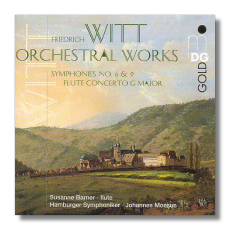
The Internet's Premier Classical Music Source
Related Links
- Latest Reviews
- More Reviews
-
By Composer
-
Collections
DVD & Blu-ray
Books
Concert Reviews
Articles/Interviews
Software
Audio
Search Amazon
Recommended Links
Site News
 CD Review
CD Review
Friedrich Witt

Orchestral Works
- Symphony #6 in A minor "Sinfonie turque" (24:39)
- Flute Concerto in G Major (22:46) *
- Symphony #9 in D minor (26:14)
Susanne Barner, flute
Hamburg Symphony Orchestra/Johannes Moesus
Dabringhaus & Grimm MDG3291299-2 74m DDD
When one sees the year 1770, Beethoven immediately comes to mind, but thanks to Providence, other excellent composers were born in that year, such as the one whose music on this disc is under review. Friedrich Witt was the sixth of eight children of the schoolmaster Johann Kaspar Witt. His father and stepfather, whom his mother married after the death of her husband in 1776, were his first musical tutors. In 1879, he joined the court orchestra of Prince Kraft Ernst as a cellist and together with Joseph Beer, a clarinettist also with the court orchestra, he toured several cities and courts during 1793 and 1794.
In the summer of 1796 they were in Vienna giving a concert attended by many distinguished personalities, none the more famous than Joseph Haydn. After this successful engagement, Beer remained in Vienna, but Witt travelled for quite some time until 1802, when in the spring of that year he was appointed Court Music Director by the Prince of Warzburg. After marrying in 1803, Witt seemed to have found a permanent home, but during those times of great uncertainty and unrest, he was obliged to serve under various masters with his last few years tinged with sadness and illness.
In 1824, Witt was dismissed on account of irregularities for which he was responsible to avert. He died of pulmonary paralysis in January 1836 aged 65. Although Witt may be considered a conservative, his output is pleasing, strongly structured and very profuse. Apart from 23 symphonies, he also wrote instrumental music, music for the stage, and a fair amount of sacred music as well.
The Flute Concerto is a showpiece for both soloist and orchestra, elegant and atmospheric; it is full of subtle beauties that fall like gentle leaves on the ear. Symphonies #6 (The Turkish) and #9 are both scored in minor keys and both display many other similarities in form and structure. Their tonalities are misleading as the two are sunny and optimistic works full of inventive and sparkling tunes within a framework of masterly orchestration. Witt is certainly not another Beethoven but still he is a composer worth investigating.
Johannes Moesus exudes interpretations of a great rhythmic and harmonic beauty from the Hamburg Symphony, who in turn gives sympathetic support for Susanne Barner, helping her deliver a breezy but assured performance. Not a showstopper then, but a disc worth buying and enjoying.
Copyright © 2005, Gerald Fenech




















